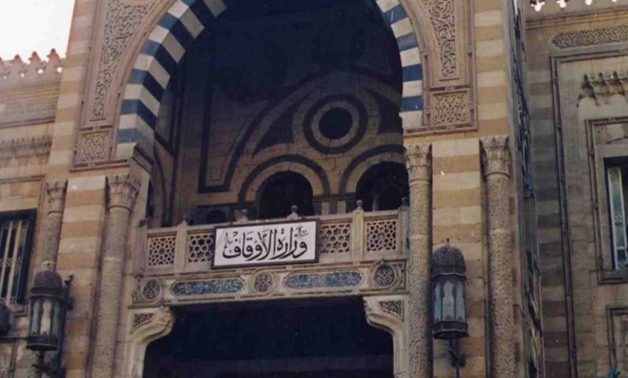
FILE: Ministry of Awqaf
CAIRO – 25November 2018: Ministry of Awqaf is working at a steady pace to correct concepts and confront extremism, Chairman of the Values Committee at the Ministry of Awqaf, Sheikh JaberTaya, stated on Nov. 24.
He added that the ministry closed all parallel entities spreading the ideology of political Islam,pointingout that the ministry replaced these entities with Islamic cultural centers.
Taya pointed out that senior professors of Al-Azhar, who are known for their knowledge in Islamic sciences, are teaching in these centers, andthat students must be universitygraduates with the desire and willingness to doIslamic studies.
The Ministry of Endowments launched an initiative to combat extremism and terrorism in Europe where hardliners are increasing.
The ministry will inaugurate soon an international academy for training clerics in foreign languages. These clerics will widen the ministry’s influence across the world.
Egypt is about to renew the religious discourse after all mosques have been placed under the Awqaf’s authority, according to Mohammad MukhtarJumaa, the minister of awqaf (endowments).
The religious discourse can often be brought up in public spheres of life with religious figures commenting on politics and the day-to-day happenings. Whilst this is common in every religion, in recent years, Egypt has been faced with a wave of terrorism and radical, extremist thought.
Egyptian President Abdel Fatah al-Sisi has repeatedly called for renewing the religious discourse as part of the war against terrorism. In order to curb extremist ideology that was often preached by extremist figures, mosques needed to be put under the Ministry of Awqaf’s jurisdiction.
Jumaa said that the first stage of renewing religious discourse was the ‘purification stage’ before taking control over the minbar. This meant purifying the minbar of extremists who spread violent ideas among citizens.
“There used to be very important mosques outside the control of the ministry, such as AsadIbn al-Forat Mosque, Aziz bellah Mosque and Al-Qaed Ibrahim Mosque in Alexandria,” said Jumaa.
Although putting them all under the control of the ministry is difficult, today all mosques in Egypt are under the control of the Ministry of Awqaf, the minister added.
In his interview with Mohamed el-Baz on the TV show "90 minutes", Jumaa added that a number of laws were issued regarding the renewal of religious discourse for the sake of restoring the ministry’s minbars from the tight grips of extremists. “All mosques have been recovered from the hands of extremists,” Jumaa said.
“We have established an international training academy and we have allocated LE 40 million to spread the message abroad and to restore the role of Egypt in protecting Islam,” referred Jumaa.
According to the report, "The International Religious Freedom in Egypt" released by the US Department of State in 2016, President Sisi called on scholars to renew religious discourse to combat extremist ideology. Sisi has repeatedly stressed that defeating terrorism is on top of his priorities and renewing religious discourse is one way to do that.
On July 17, 2017, metro fatwa kiosks were set up in Cairo’s metro stations by Al Azhar to offer religious advice to commuters on a daily basis. This was an attempt to combat extremist ideology by simplifying religious messages for the public, as per a previous article from Egypt Today.
Novelist and Socio-political research, Ammar Ali Hassan, wrote an article titled “A New Religious Discourse” in Al Ahram Weekly, saying that “Islam has been hijacked.”
Many do argue the same believing that terrorism and extremism led to new thoughts being spread via mosques that are not directly under the control of the ministry.
However, according to Dostor, MP Mohammed Abu Hamid, a member of the House of Representatives, said that Al-Azhar, with its current thinking, is incapable of leading the way towards renewing the religious discourse.
Many have spoken about renewing religious discourse, such as artist Mohamed Abla, who called for discussing the matter at the Arab Ministers Culture Conference.
“Before the Arab Ministers Culture Conference convenes in Cairo, we must tell them that the most important issue to be addressed is the renewal of religious discourse,” said Abla.
He clarified that renewing religious discourse is not completely the responsibility of Al-Azhar and the Awqaf Ministry. Abla believes that this is also the responsibility of intellects.
Abla pointed out that it is important to discuss the radical changes that are happening in Arab countries because these changes have a lot to do with culture and values which impact a person’s thought.

Comments
Leave a Comment